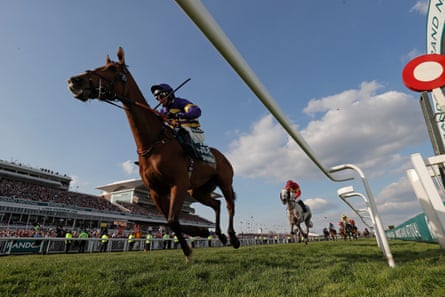The Guardian: Fox Emerges Victorious in Grand National Despite Animal Rights Protests

On a day when the drama and danger of the world’s most famous steeplechase appeared to purr in perfect synchronicity, two moments quickly became burnt into the memory. The stillness of Derek Fox’s riding amidst the mayhem of a Grand National even more brazenly chaotic than usual before sending 8-1 favourite Corach Rambler into glory. But also the extraordinary sight of dozens of animal rights activists using ladders to climb into Aintree’s grounds, trying not only to sabotage the race, but the hearts and minds of those watching too.
For anyone who sits uneasily on the fence when it comes to racing, the 175th National really did have pretty much everything: sorrow, suffering, glory and pain. But it was especially hard to ignore the suffering, in the grim knowledge that two more horses had died on National Hunt racing’s biggest day, including Hill Sixteen after an horrific fall on the first fence.
While the race ultimately went ahead, it must count as a success for Animal Rising, the direct action group behind the delay and disruption. The news that 118 of its members were arrested for criminal damage and public nuisance offences was the first item on Saturday night TV bulletins. So how long before such protests become an annual Aintree tradition, alongside office sweepstakes and pinstickers’ guides?
But for the millions who retain their love affair with the National, there was much to smile and marvel about. In recent months, the winning trainer Lucinda Russell has lost her father as well as One for Arthur, the horse who brought her first Grand National success in 2017. After the race, having celebrated Corach Rambler’s win, she shared the touching moment where she spread some of One For Arthur’s ashes at the finishing line.
There was joy too in the disarming attitude of Derek Fox, who had been a doubt for this race after injuring his shoulder. Not that you would have known it given the way he nursed Corach Rambler round before striking decisively for home. “He is everything you want from a National horse,” he explained afterwards. “He’s just brilliant.”
There was also happiness from the small syndicate of seven racing fans who had been handsomely rewarded for their £2,400 investment with a cheque pushing towards £100,000 each. The youngest member, 21-year-old student Cameron Sword, admitted he couldn’t believe his luck. “I’m in dreamland, I’m lost for words.”
But inevitably this was another Grand National where animal welfare issues loomed and lingered. In some ways this is nothing new. As far back as 1954, the Manchester Guardian reported a debate in parliament where one Conservative MP, HS Johnson, foresaw “ugly demonstrations” at the race after receiving more than 600 letters, telegrams and petitions, all unsolicited, about animal cruelty.
Noting that of the 192 horses which had started in the previous five Grand Nationals, only 36 had finished and nine had been killed, Johnson added: “The facts show that this type of race in its present form cannot in all public decency be tolerated any longer.”
Sign up to The Recap
The best of our sports journalism from the past seven days and a heads-up on the weekend’s action
after newsletter promotion
Thankfully much has changed since then. The fences are safer. The race is much less taxing. But National Hunt racing by its very nature will always carry the risk of death. And with broader sensibilities changing too, you do wonder whether it will still be sustainable in two or three decades’ time. A recent University of York study certainly had a stark message: finding that over half of those under 40 would not consider attending horse races due to welfare issues.
Afterwards the Animal Rising spokesperson Nathan McGovern told the Observer that the protest was the first of many they had planned for the summer – and other racing events, such as Royal Ascot, could also be targeted. “We are a nation of animal lovers but we often tell ourselves convenient lies,” he said. “However the younger generation are not going to take it any more.”
When those criticisms were put to Russell, she urged activists to learn about how well horses are looked after in Britain. “I just say to them, come and see how the horses are kept,” she said. “I come from a non‑racing background and I can assure you there are a lot more welfare issues elsewhere.”
Perhaps. Yet you wonder how much those words would have resonated on another day where battle lines were sharply drawn and, you sense, few minds were changed.




